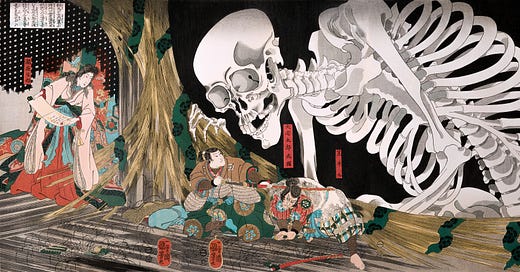The feminist slogan, “The personal is political,” is a phrase through which I find myself molding and realigning my efforts. I recognize that the strategies with which I live my personal life are the same ones which echo throughout the ways I emerge in the collective. “How you do one thing is how you do everything.” Through this lens, as I have pondered extreme emotional experiences, I have come to believe that the emotional is spiritual. By this, I mean that the landscape of our feelings and lived experiences is the manifestation of our souls.
Due to the intangible nature of emotion, the way it influences actions and beliefs, I feel that for too long, we have relegated the emotional to a secondary role in the hierarchy of being human. I find hierarchies largely unhelpful: they function to distract us from the interconnectedness of time and further entrench our ways of thinking within binaries. With the exception of some hierarchies—I’m thinking of, for example, the way the Yoruba community thinks of the elders, regardless of gender, in a hierarchy of seniority which requires honor—I feel that the sooner we can dismantle these structures, the better it will be for us all.
The role of emotion in spiritual wellbeing has been debased. (How? By whom? Questions to revisit.) People imagine that what one chooses to believe is superior to the passions of one’s heart and the emotional experiences therein. Here, I notice that people are torn in two: they abandon their heart in one world and embrace a loveless existence in another. Yet, emotion is not easily abandoned, if at all. (This is one of the reasons ideologies like toxic masculinity and white/non-intersectional feminism can be so dehumanizing.) The heart and emotions are central to the spiritual nourishment of one’s life, integral to the personal and thus the political. Emotion will pursue us, even into the darkest depths of despair. When we are capable of being present with the complexity of our emotions, then we are capable of being present with the complexity of the spiritual.
This does not have to be couched in terms of any religion or system of belief, though these avenues are useful and grounding. The spiritual, as the emotional, transcends the terms we would seek to couch these experiences into. Putting words to these experiences can be helpful, especially in terms of finding community and giving shape to the meaning that we have found within our spiritual experiences, but ultimately, turning the emotional into a intellectual exercise tends towards pathologization or some other form of forcing dynamic relationships into binaries or fixed perspectives. I find that, often when I try to put my emotional experience into words, outside of communicating with a loved one or communing with myself and God, I am trying to make real that which is already real. Similarly to spiritual experience, when we intellectualize the ways we are experiencing that which is beyond logic, especially within colonial frames of logic, we begin to degrade the beauty of the experience.
I believe that many of the fractures that can be found within society have to do with disrespecting one another’s emotional experiences, which of course, is one of the foundational experiences of childhood. The lack of empathy has become an ingrained aspect of our society. Empathy has become something we can only afford to those we believe have earned it if they can demonstrate to us that they are, in fact, worthy of our empathy. Instead of an empathy founded on the basis of shared humanity, even to oppressors due to the way their oppressive ways robs them of humanity, we engage in a reward-punishment system with ourselves atop the hierarchy determining who is worthy and who isn’t. And this isn’t to say that you have to like or love anyone, or even to command anyone into a systematic way of practicing empathy, but I feel that we have reached a conclusion with the way we do things now.
Your support is emotionally and spiritually nourishing! Please share this with a friend. And if you’re feeling generous, and resourced — buy me a coffee.





